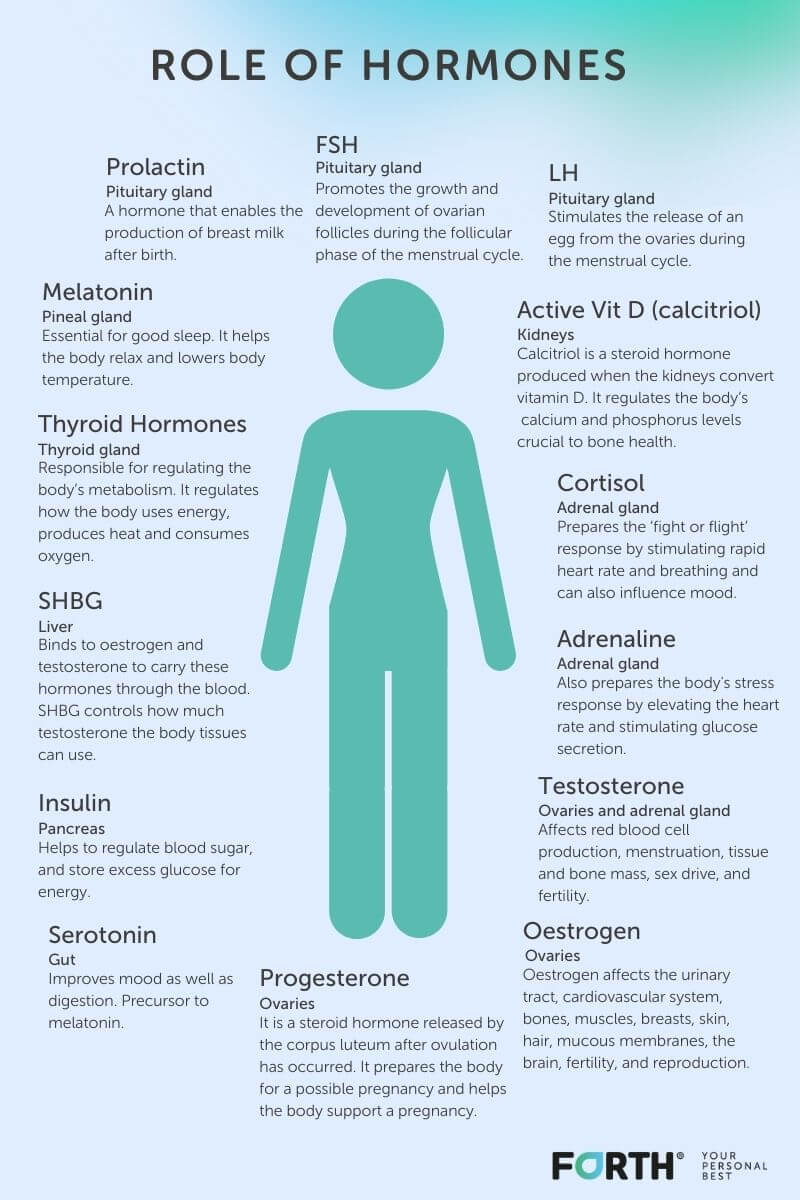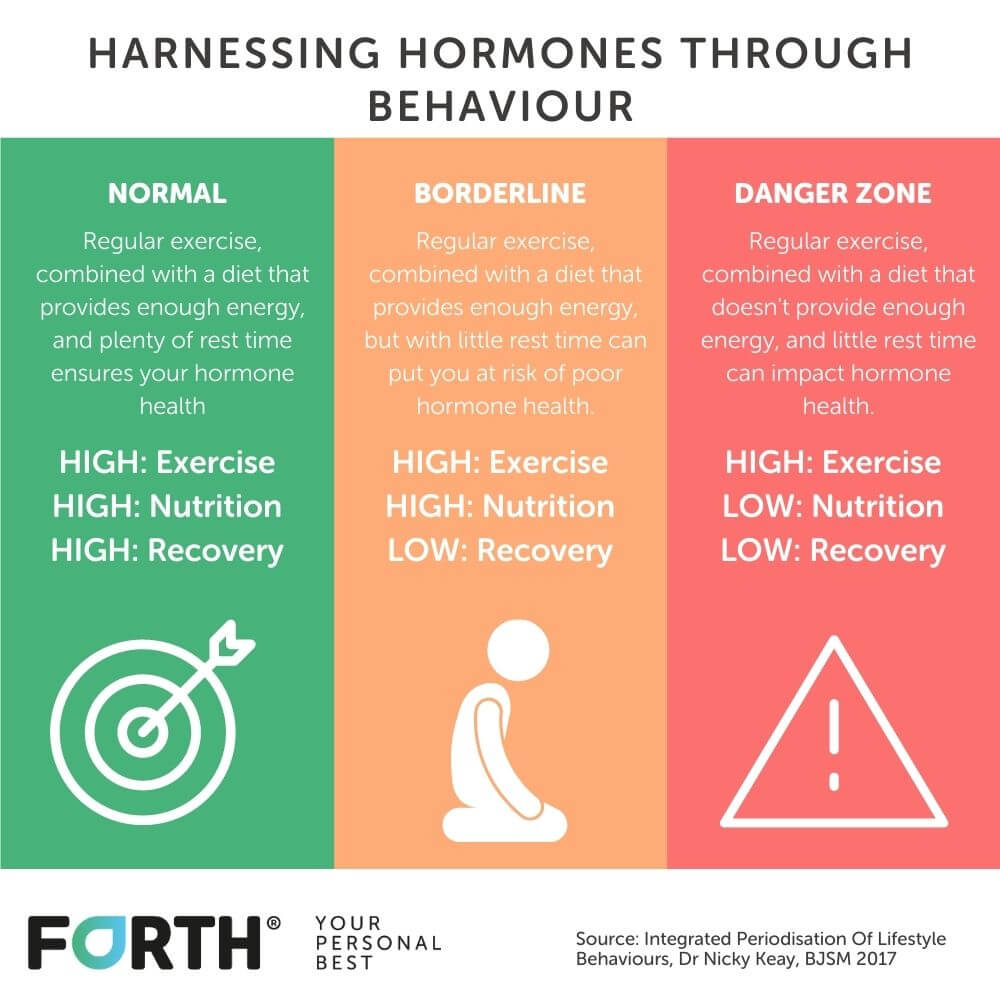8 mins read
The Role Of Hormones In Women’s Health

- Female Hormones and Women's Health
- What’s The Role Of Female Hormones?
- What Do Hormones Have To Do With Women’s Health?
- How Hormones Change As Women Age
- What Causes A Female Hormone Imbalance?
- How Your Lifestyle Can Impact Your Hormone Health
- Exercise And Hormone Health
- Strength / Resistance Training
- Your Own Body Weight
- Resistance Bands
- Weights
Female Hormones and Women’s Health
The focus on female hormones often centres around reproduction and fertility, and how the female sex hormones oestrogen and progesterone impact reproductive health.
While important, there are other hormones that play a crucial role in women’s health and hormonal imbalance can impact all aspects of a woman’s health, not just fertility.
We take a look at the role of female hormones in the body, the causes and symptoms of female hormone imbalance, and how lifestyle and diet can impact hormone health.
View our Hormone Tests and start your journey to better health today
What’s The Role Of Female Hormones?
Hormones are internal chemical messengers which play a crucial role in our bodies by acting on our DNA to direct the various cells in our body to produce specific proteins.
Hormones are produced by endocrine glands which are distributed throughout the body and include the control hypothalamus and pituitary glands together with the endocrine glands producing response hormones including thyroid and parathyroid glands, gonads (ovaries or testes) and adrenal glands, to name a few. Hormones produced by these endocrine glands travel in the bloodstream to their target cells in tissues and organs disturbed throughout the body. A single hormone has far-reaching effects throughout the body. For example, there are receptors for the female hormone oestrogen not only in the female reproductive tract, also in bone, gut, cardiovascular system and brain. In this way, a particular hormone can have far-reaching effects on many biological systems in the body.
Furthermore, hormones interact which each other, forming a complex network. For example, the production of all hormones is regulated through a series of feedback loops. In many cases, this feedback loop is via the major control centre for hormone regulation: the hypothalamus-pituitary axis in the brain. There are also interactions between the response hormones themselves such as cortisol (stress response hormone) and thyroid hormones.
The infographic below lists the key hormones essential to health and wellbeing.

What Do Hormones Have To Do With Women’s Health?
Although the complexity of the hormone networks is fascinating, what has this got to do with health in practical terms?
The World Health Organisation defines health as not just an absence of disease, but rather a positive physical, mental, and social wellbeing.
As there are receptors for hormones throughout the body, they play a vital role in optimising all aspects of health and performance (1). Furthermore, the pattern of hormone production changes throughout a woman’s life, so this impacts health not just today, but how our health evolves over our entire life.
How Hormones Change As Women Age
From the age a woman reaches puberty to around her mid-30s hormone levels are stable and fluctuate naturally each month in line with the menstrual cycle. Periods will be regular in women with a healthy hormone balance unless a woman is on some form of contraceptive pill.
As a woman enters her early to mid-40s her ovaries will start to become less responsive, resulting in the start of the perimenopause where oestrogen and progesterone levels fluctuate more, and periods become less regular.
Oestrogen and progesterone levels gradually decline during the perimenopause and FSH and LH levels increase. These changes cause a hormone imbalance resulting in menopause symptoms such as irregular periods, mood changes, hot flushes and loss of libido.
The transition from menopause to post-menopause occurs after a woman has not had a period for at least 12 months. Oestrogen, progesterone, and testosterone drop to very low levels. Declining oestrogen levels can lead to longer term health issues such as cardiovascular disease and osteoporosis.
Read our guide to the menopause.
What Causes A Female Hormone Imbalance?
A regular menstrual cycle is a good sign of a healthy, balanced endocrine system. Any changes in a woman’s period outside of pregnancy, menopause or the use of contraception should be investigated as it could be a sign of hormone imbalance.
A hormone imbalance may be caused by endocrine gland dysfunction or other factors such as lifestyle – poor diet, stress, lack of sleep or over exercising.
As hormones play a key role in regulating different processes in the body, an imbalance can cause a variety of symptoms. It can also be a sign of an underlying health condition, particularly in women who are not experiencing a lack of ovarian response due to the menopause.
It’s also important to understand your normal hormone levels and how they change over time, so you can catch any issues early on.
Read more on causes of hormone imbalance.

How Your Lifestyle Can Impact Your Hormone Health
As hormones are so crucial to your health, throughout your life, how can you balance your hormones and ensure that they are in top form?
Making informed lifestyle choices will support your hormone health. This can be achieved by effectively harnessing your hormones through behaviours (2).
The three-key lifestyle behaviours under your control are the triad of exercise, nutrition, and recovery. An optimal balance of all these factors will favour healthy hormones and therefore all elements of physical mental and social health.
The chart below shows how a balanced lifestyle that includes exercise, with enough nutrition to support the energy your body is using, combined with plenty of rest/recovery (particularly if you do a lot of exercise and high intensity exercise), will ensure your hormones balanced.
Where you run the risk of a hormonal imbalance is not having the right level of nutrition to support the energy your body is expelling through exercise and day-to-day living, combined with low recovery periods or lack of rest. Here, even non-athletes can suffer from what’s called RED-S (relative energy deficiency in sport). This can lead to your body shutting down non-essential functions in order to preserve energy for vital functions such as keeping your heart beating and lungs functioning. In women, this can result in her periods becoming irregular or stopping altogether.

Exercise And Hormone Health
Exercise is one of the key lifestyle factors in helping you attain optimal health in terms of physical and mental wellbeing (3). Exercise stimulates the endocrine system to produce hormones, which essentially support our health and make us fitter.
So, what types of exercise are most beneficial to support our hormones and our health?
Cardiovascular Exercise
Cardiovascular exercise has been a long-standing recommendation. This means the type of exercise where you get a bit out of breath over a sustained time of at least 20 minutes. Continuous exercise like fast walking, jogging, running, cycling, swimming are all types of cardiovascular exercise.
Strength / Resistance Training
A more recent addition to the Government’s recommendations on exercise is strength training. It’s recommended that we all do some form of resistance/strength exercise at least 3 times a week.
Strength training becomes a particularly important consideration as we get older and we need to actively combat a condition called sarcopenia, which is a loss of muscle mass and strength. Sarcopenia directly correlates to the physiological age-related decline in some key hormones such as growth hormone and sex steroids.
In women, this will be the decline of oestrogen levels as their ovaries become less responsive as she reaches menopause and beyond. In addition, the risk of developing osteoporosis also increases in post-menopausal women, so strength exercise will help keep bones strong too.
Strength training also helps prevent metabolic syndrome which comprises of insulin resistance. This leads to type 2 diabetes mellitus, inflammation hypertension, dyslipidaemia, and fatty liver disease3. This is because resistance exercise benefits the hormones involved in metabolism. As the muscles are a very metabolically active tissue, the benefit derived from strength training persists even after you’ve stopped exercising.
You will be relieved to hear, if like me, the sound of going to the gym to lift weights fills you with dread, there are other options.
Your Own Body Weight
Using your own body weight is a form of resistance training, so doing exercises such as push ups, squats, leg raises etc all count as resistance training. Activities such as yoga are considered good for building muscle and bone strength and the poses use your own body weight.
Resistance Bands
Resistance bands are used a lot in Pilates and are ideal as they provide what’s known as “closed chain” exercise – which is safer than free weights – and also provides a full workout for muscle contraction (4).
Swimming is also another form of resistance exercise and works all muscle groups in a safe way that is unlikely to cause damage to your muscles, unlike lifting heavy weights in the gym.
Weights
Hand weights, dumbbells or even improvising with bags of sugar of empty plastic milk bottles filled with water, all provide good options for weights.
Read our blog ‘Exercise And Periods: Why More Research Is Needed’.
Hormones And Diet
Ensuring that you maintain a diet that contains the full range of food groups (carbohydrates, protein, fruit and vegetables, some fat), will support hormone health. Amounts will vary according to individual in terms of body composition and energy demands.
Getting Personal
As we are individuals, a one size fits all approach is unlikely to be helpful. This applies in terms of personalised medicine and also in terms of lifestyle approaches to optimising your health (5). Luckily, this is where we can help. We want to support women in gaining a better understanding of their hormone health and empower them to make the changes they need to improve overall physical and mental wellbeing.
We have launched the next generation in female hormone blood tests, MyFORM™, which will give you the personalised insights you need to make these informed lifestyle choices.
Conclusion
Female hormones influence all aspects of women’s health, not just reproduction and fertility, so it’s important to understand how your hormones play a role in overall health. By understanding the role of hormones within the body you can make the right lifestyle choices to support a healthy endocrine system.
Article references
This information has been medically reviewed by Dr Thom Phillips
Thom works in NHS general practice and has a decade of experience working in both male and female elite sport. He has a background in exercise physiology and has published research into fatigue biomarkers.

Dr Thom Phillips
Head of Clinical Services
Related articles
Like this article? Here are some more based on similar topics.



